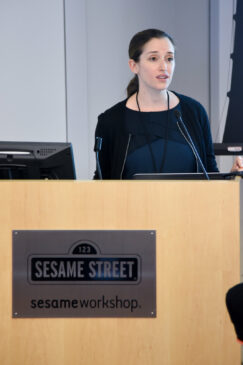
When I met Michael Levine outside a conference at UPenn in 2012, I had no idea how much that conversation would shape my career. From my earliest visits to the Joan Ganz Cooney Center office, I was struck by the infectious sense of purpose and energy there.
Starting in 2013, I had the good fortune to partner with Michael, Lori Takeuchi, and the JGCC team in a multi-year research project to understand how initiatives to advance digital equity were influencing families’ technology experiences. We set out to investigate how kids and families who were income-qualified for subsidized broadband and digital devices were making decisions about adopting and engaging technology for learning.
With generous support from the Bill & Melinda Gates Foundation, we began with more than 300 hour-long interviews in Spanish and English, with parents and their elementary school-aged children, in school districts in Arizona, California, and Colorado. The study’s second stage was a survey of lower-income parents about digital inequality and their families’ technology engagement—the first nationally representative effort to investigate these issues among lower-income families. The results were published in 2016 as the Opportunity for All? report (written with Victoria Rideout), and the findings supported the Federal Communications Commission’s decision to expand the Lifeline Program, expanding broadband access for the lowest-income U.S. families, shortly thereafter.
Providing policymakers with the careful evidence they need to materially improve conditions for kids and families was, for me, the best part of working with the JGCC. My time as a Senior Fellow gave me many opportunities to learn from Michael Levine about writing for policymakers at state, federal, and local levels; we wrote a policy brief that was cited by the White House Council of Economic Advisors, editorials translating the study’s findings for educators, and with the creative talents of Catherine Jhee, produced infographics that reached broad audiences.
That early work on digital inequality among lower-income families came, of course, long before the pandemic. We could never have foreseen just how central technology would become to children’s abilities to continue to learn—and, just how cruel being under-connected would be for millions of children in remote instruction. The research for Opportunity for All? uniquely positioned us to investigate pandemic remote learning experiences, which we did in 2021 in partnership with Noggin and New America in the Learning at Home While Under-Connected study. I will always be grateful for my time at the JGCC and for what I learned there about translating research findings for policymakers and educators in order to support them as they support the learning and development of children and families.
A very happy 15th anniversary to the Joan Ganz Cooney Center and all the special people in the family it has created!
Vikki Katz is Professor in the School of Communication at Chapman University (Orange, CA). Until 2022, she was Associate Professor in the School of Communication and Information at Rutgers University (New Brunswick, NJ). Her research focuses on digital inequality and family technology engagement within immigrant, lower-income, and working-class families and has been supported by the Bill & Melinda Gates Foundation, Carnegie Corporation of NY, Grable Foundation, Noggin, Overdeck Family Foundation, Russell Sage Foundation, and Spencer Foundation.
She is Editor of Journal of Children and Media and on the Board of Directors for the National Center for Families Learning and the Advisory Board for the CPB-PBS Ready to Learn Program, which supports development of educational media targeted at preschool and early elementary school-aged children and their families to promote early learning and school readiness.

